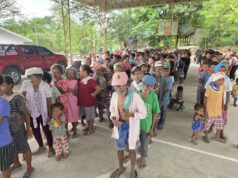“Change for the better,” Mayor Edwin “EdSa” Santiago assures informal settlers affected by the Manila-Clark railway project. Contributed photo
CITY OF SAN FERNANDO – The city government and national government agencies assured informal settlers affected by the Manila-Clark railway project of support and assistance in their relocation and livelihood.
“Ang magiging focus ng ating pagtulong sa kanila ay ang social preparation bago yung mismong pagsisimula ng railway project. Matapos natin ma-identify yung qualified families, tayo ang mangangasiwa sa mga kinakailangang dokumento o proseso at tutulong tayo sa maayos na relocation nila sa ilalim ng programa ng National Housing Authority, at, magbibigay tayo ng livelihood programs para sa kanila,” said city local housing and settlement division chief Louie Clemente.

Concerns over the impact of the railway project to informal settlers took centerstage at the first Local Inter-Agency Committee (LIAC) meeting of the city and national agencies led by the Department of Transportation last Wednesday at the Heroes Hall here.
Construction of the 53.1-kilometer-long railway connecting Malolos, Bulacan to the Clark Freeport Zone and Clark International Airport is set next year while that of the Manila-Malolos phase of the project is scheduled before the end of the year.
The railway alignment runs through 10 barangays within the capital city.
In its official website, the National Housing Authority said that informal settlers affected by an infrastructure project will benefit from its resettlement program, including the “provision of housing units, community facilities, socio-economic and other community support programs.”
Jake Sabdao, who heads the Social Safeguard and ISFs Resettlement of the North-South Commuter Railway Extension Project, said the DOTr was optimistic the project will be successful, given the full cooperation of the agencies.
“The DOTr is confident about the humane resettlement of the ISFs and with the cooperation of agencies, as manifested in the 1st LIAC meeting, we will be able to implement the project on time and the affected people will have better lives,” Sabdao said.
This, even as he cited the city government for convening the meeting: “On behalf of the DOTr, we would like to commend the city government of San Fernando, headed by Mayor Edwin Santiago, for convening the Local Inter-Agency Committee that will oversee the ISFs relocation process.”
For his part, Santiago, who chairs the LIAC, said that this project will enable the government and the families to face a change for the better.
“Marami ang benepisyo ng proyektong ito at ang pinaka-nangunguna dito ay ang pagbabago. Pagbabago sa paraan ng transportasyon natin kung saan sadyang mapapabilis ito. Pagbabago sa estado ng imprastraktura sa ating rehiyon at sa bansa. At, pagbabago sa buhay ng ating informal settlers na makakapag-simula sila ng mas payapa, ligtas, at matiwasay na buhay,” the mayorsaid.
Apart from the informal settlers, the government also has a separate support program for the private-owned structures and houses affected by the project, including the assistance of DOTr and Land Bank of the Philippines for the property valuation and appraisal.





